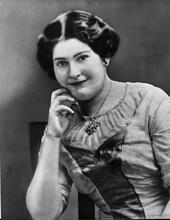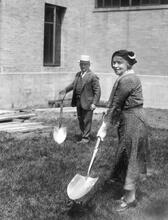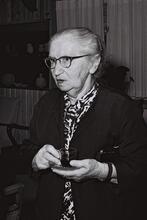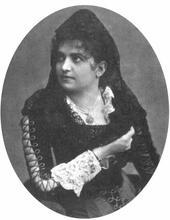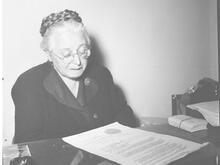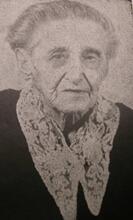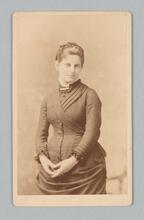Rosalie Cohen
Rosalie Cohen (1910 - 2010) devoted her life to promoting Zionism, both in her hometown of New Orleans and also on the national and international scenes. She is shown here introducing Eleanor Roosevelt at the launching of New Orleans's Israel Bonds Organization in 1951.
Institution: Private collection.
A lifelong Zionist, Rosalie Cohen worked to promote Jewish culture and education both on a national level and locally in New Orleans. Cohen served as the first female president of the Greater New Orleans Jewish Federation from 1959 to 1961 and cofounded the JCC Senior Citizen’s Club and the Home for the Jewish Aged. In 1960 she created the Lemann Stern Young Leadership Group to train young Jews in leadership through missions to Israel. On a national level, she served as vice president of the American Council of Jewish Federations from 1963 to 1965 and was a founding member of the National Foundation for Jewish Culture. She also served as national vice president of the Jewish Educational Services of North America, which supports Jewish grade-school education.
Jews in New Orleans
I have lived through most of this century and observed all the -isms: Communism, Socialism, Fascism, Nazism, Zionism … only Zionism survives. It has been a great privilege to devote my life to Zionism, the millennial dream of the Jewish people.
—Rosalie Cohen
Role model and mentor to a generation of young Jews, Rosalie Cohen spent most of her life promoting Zionism and Jewish education in her hometown of New Orleans and on the national and international scenes.
Cohen was born on May 27, 1910, in New Orleans. Her parents, Fanny (Brener) and Leon Palter, had emigrated separately from Bialystok, Russia, around 1905. Educated as a chemist and textile dyer in Russia, Leon Palter initially became a peddler in New Orleans and, in 1921, opened a furniture business called Universal Furniture House.
The seven-thousand-strong Jewish community in New Orleans (comprising less than one percent of the city’s population) consisted overwhelmingly of second- and third-generation classical Reform Jews of German heritage. The Palters, by contrast, were Russian immigrants, Orthodox, and dedicated to Zionism. From an early age, Rosalie was taught about the importance of the Jews’ homeland. As a child, she attended Zionist meetings with her parents. Between the ages of eight and sixteen, she studied the Torah she-bi-khetav: Lit. "the written Torah." The Bible; the Pentateuch; Tanakh (the Pentateuch, Prophets and Hagiographia)Torah and Hebrew daily, achieving fluency under the tutelage of the distinguished Russian Hebrew poet Ephraim E. Lisitzky. The Palters had helped to bring Lisitzky to New Orleans in 1918 from Milwaukee, where he had been teaching Hebrew to Golda Meir. In his new base, Lisitzky established the Communal Hebrew School.
In 1929, at age nineteen, Rosalie Palter married Dr. Joseph Cohen, a surgeon and native New Yorker who shared her love of Zion. During their honeymoon, the couple attended the 1929 World Zionist Congress in Zurich, Switzerland, the historic meeting in which Zionists and non-Zionists were united in the newly formed Jewish Agency. The Cohens also visited Palestine, where they were incorrectly reported as having been slain during Arab-Jewish skirmishes.
Education and Career
Cohen studied at the Tulane University School of Journalism, developing eloquent written and oral skills in the process, and graduated with a BA in 1930. During World War II, she was employed as a Hebrew translator by the United States Department of Censorship. Starting in the 1940s, she began annual visits to the future State of Israel.
In New Orleans, Cohen worked to strengthen the intellectual and cultural life of the local Jewish community. She served as the first female president of the Greater New Orleans Jewish Federation from 1959 to 1961. She was a cofounder of the Jewish Community Center Senior Citizens Club in the late 1950s, the Home for the Jewish Aged in 1962, and Women in Federation in 1966. Believing that “Jewish education is the source of Jewish continuity,” she focused particular attention on training future Jewish leaders (especially women) and on developing Jewish academic programs. She established the New Orleans Lemann Stern Young Leadership Group in 1960, whose purpose was to educate young Jewish women and men in leadership skills and philanthropy through exposure to national leaders and missions to Israel. Cohen’s program philosophy eventually became a national model for federation leadership training.
Cohen was responsible for several other educational programs for New Orleans Jewish women: a program at the New Orleans Enduring Heritage Institute (1965–1972), a forum for presidents of Jewish women’s organizations (1980s), and a Torah study group (1985–1993). Her SabbathShabbat table attracted eminent scholars, political thinkers, lay leaders, and travelers, who in turn have enriched the somewhat geographically isolated New Orleans Jewish community.
For her civic activities and leadership, she received the keys to the city from three different New Orleans mayors: Victor Schiro in 1960, Moon Landrieu in 1971, and Marc Morial in 1996. She also received a Tulane School of Social Work Honorary Award in 1997.
At the national level, she was the first elected female vice president of the American Council of Jewish Federations (1963–1965). She was a founding member of the National Foundation for Jewish Culture (NFJC) in 1960. She helped to establish the NFJC’s funding program for doctoral students of Jewish studies—a program that contributed to the dramatic increase in the number of chairs of Jewish learning at American universities from only three before 1960 to ten times that number in 1997. Also in the early 1960s, Cohen served as national vice president of the Jewish Educational Services of North America, an organization dedicated to fostering Jewish grade-school education.
After her first visits to Israel in the 1940s, Cohen sought to promote Jewish education at an international level. In Israel, she worked with Professor Moshe Davis, chair of Hebrew University’s International Committee for University Teaching of Jewish Civilization. The committee guided the development of departments and programs of Jewish studies around the world.
Cohen’s talents as a leader and organizer, as well as her gracious southern manners, were key assets in overcoming the obstacles she faced as a Zionist in a southern city and as a woman in a predominantly male Jewish national arena. Despite her ties with national and international Jewry, she particularly cherished her New Orleans community, which has nurtured such eminent figures as Judah Touro, Judah P. Benjamin, and Rabbi Max Heller. Cohen herself was a builder of this community, leading it from “the flight [from Israel] to the return,” from the “abandonment [of Israel] to the embrace.” As she said, “I have had a vision of what a Jewish community ought to be, and I felt I had a responsibility.”
Rosalie Cohen died on April 7, 2010.
“Assails the British on Palestine Riots—New Orleans Doctor Declares Soldiers Witnessed Murders Without Interfering.” NYTimes, October 14, 1929.
“Jewish Stalwart Excels as Leader.” New Orleans Times-Picayune, January 21, 1995.
“New Orleans Residents Recall Robin’s Lasting Impression.” New Orleans Times-Picayune, November 7, 1995.


